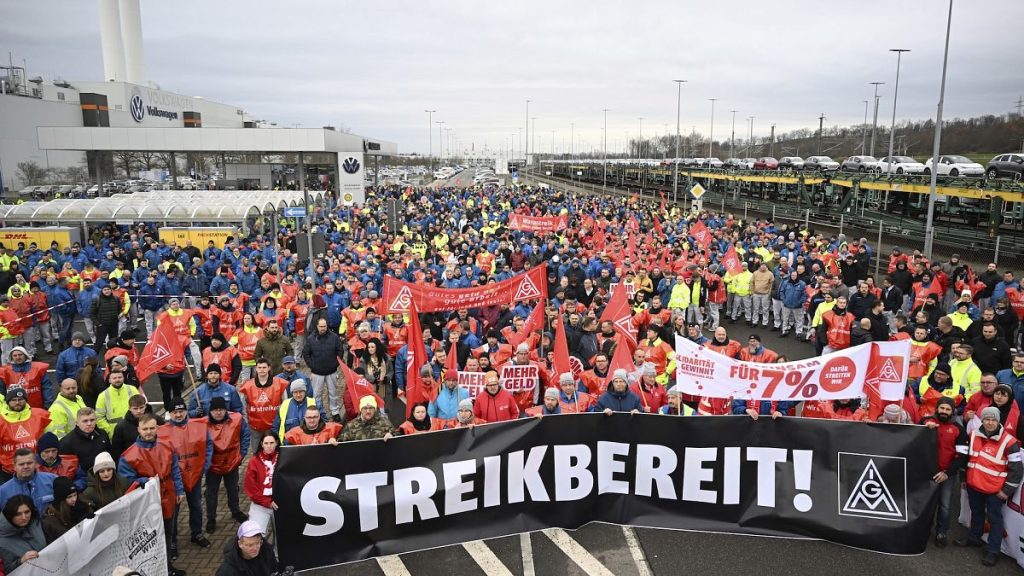Volkswagen workers across Germany have initiated rolling two-hour strikes at nine different plants, highlighting growing dissent against the company’s proposed cost-cutting measures. The protests primarily stem from Volkswagen’s management announcing plans for significant pay cuts and the potential closure of factories in Germany, a move that the company claims is necessary to navigate a challenging European car market. The largest protest took place at the Wolfsburg plant, Volkswagen’s main base, where hundreds of employees rallied with whistles and chants, indicating their displeasure with the management’s decisions. The situation has escalated due to unsuccessful negotiations between Volkswagen and unions, which have left tens of thousands of workers feeling compelled to take action in their quest for financial security.
Central to the workers’ grievances is Volkswagen’s proposition to reduce employee salaries by 10%, coupled with plans to shut down at least three factories. Management cites mounting challenges such as rising labor costs, shortages in raw materials, and a sluggish transition to electric vehicles as justifications for its proposed cuts. However, the atmosphere within the company is tense, and the impending changes have sparked fear among employees about their job security and financial stability. Daniela Cavallo, the chief employee representative at Volkswagen, vocalized the workers’ frustration during the demonstrations, emphasizing that employees should not bear the weight of management’s historical failures, particularly regarding the development of affordable electric vehicles.
Volkswagen’s call for cost reductions is perceived as urgent; the company seeks to align its operational costs with those of its international competitors, especially in Eastern Europe and South America. Union leaders argue that the responsibility for addressing the company’s financial challenges should not fall solely on workers but should include contributions from management and shareholders as well. The upcoming negotiations, set to occur soon, are positioned as critical in determining whether the company can find common ground with its employees or if the conflict will escalate further, resulting in prolonged unrest.
The strikes are classified as warning actions, a typical strategy employed during wage negotiations in Germany. Following the expiration of a mandatory peace period that prohibited strikes, the IG Metall industrial union has stated that additional job actions beyond those currently in motion will be announced later. This careful strategizing reflects a calculated approach by the unions, aiming to leverage the collective bargaining process while maintaining momentum among workers and preserving the potential for more aggressive actions if necessary.
The pressures facing Volkswagen are exacerbated by a decline in demand for vehicles in Europe, which has fallen from 16 million to roughly 14 million annual sales amid increasing competition, particularly from Chinese manufacturers. With Volkswagen historically holding a substantial market share in Europe, the downturn translates into a staggering potential loss of around 500,000 car sales per year. As the European automotive landscape shifts, Volkswagen’s once-protected profit margins, aided predominantly by a strong performance in China, have become precarious, necessitating an urgent reevaluation of their operational strategies to adapt to the changing environment.
The outcome of the looming negotiations will be pivotal not just for Volkswagen employees but potentially for the broader German economy, especially given the critical role of the automotive sector. As workers prepare for another round of discussions, the stakes are higher than ever. Both sides are gearing up for a conflict that could shape the future of Volkswagen’s employment structure and operational capabilities, in a climate poised for change amid impending national elections. As the labor dispute progresses, the calls for solidarity among the workforce are becoming increasingly pronounced, heralding a determined push from employees to defend their rights against significant corporate restructuring efforts.

